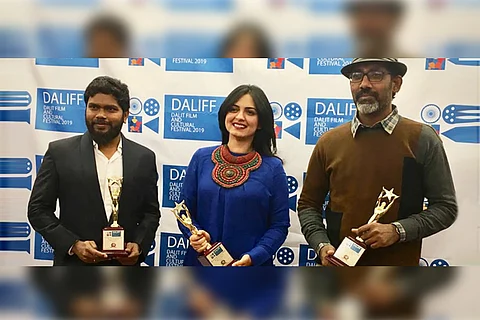

“My goodness, you have so many stories in your life since childhood … I have none. I just studied Class 12 and came to college, that’s it.” This is what Jo, an upper caste girl, tells Periyerum, a Dalit boy, in the movie Pariyerum Perumal. Directed by Mari Selvaraj and produced by Pa Ranjith, the film was screened at the inaugural Dalit Film and Cultural Festival held on February 23-24 in New York. It was a befitting start to the event, indicating the necessity to showcase and celebrate Dalit stories and culture.
The festival, called DALIFF, was part of a two-day extravaganza held at and co-hosted by Barnard College, Columbia University and The New York School. Conceptualised and hosted by Ambedkarite organisations based in the US, it was inaugurated by Pa Ranjith, Nagraj Manjule and actor Niharika Singh.
Speaking as one of the chief guests, Pa Ranjith said, “In movies, I saw Dr Ambedkar’s portrait picture only in police stations and courts, but never in the house of the lead actor, and that is precisely what I wanted to change through my movies.”
The audience at a panel discussion
Pa Ranjith is right. A study done by The Hindu in 2015 reported that a substantial proportion of Bollywood movies in 2013 and 2014 had upper caste lead characters and only two movies had well-defined backward caste lead characters. The trend continues, not just in Bollywood, but in the cinema of all languages.
DALIFF held the world premiere of Nagraj Manjule’s National Award-winning Marathi short film Pawasach Nibandh (Essay of the Rain). Nagraj said language does not matter as long as you feel important to express your thoughts and stories.
But what constitutes a Dalit film? Director Subodh Nagdeve – whose film Bole India Jai Bhim based on the life of Hardas Laxman Rao Nagrale was screened at the festival – said: “It is true that every once in a while, Savarna filmmakers have made movies on Dalits, but they do not touch the real life nor the heart of Dalits as the movies made by Dalit directors do. Look at Fandry, it is such a touching movie and shows the real pain from a Dalit point of view.”
Exhibition of Dalit literature at the festival
The festival included a string of thought-provoking films in Marathi, Malayalam, Tamil and Nepali, covering a wide variety of Dalit stories and assertion. The other movies screened included Pa Ranjith’s Kaala, Manjule’s Fandry, Neeraj Ghaywan’s Masaan and Jayant Cherian’s Papilio Buddha. Some of the documentaries showcased were Manjule’s Pistulya (Marathi), Divya’s Kakoos (Tamil), Nabin Subba’s Dalan serial (Nepalese), Somnath Waghmare’s The Battle of Bhima Koregaon (Marathi), Rao Rampilla’s Gandhi, Untouchables and Me (English) and Deepa Dhanraj’s We Have Not Come Here To Die.
During the panel discussion “Dalit Cinema: Art of the Century”, the chief guests responded to a wide range of questions. Nagraj Manjule said, “Movies are made out of perspectives. If a movie is made keeping Ram in mind, then Ravana automatically becomes a villain. But if someone makes a movie based on Ravana’s viewpoint then, it may portray Ram as a villain.” He added, “All -isms converge into humanism and I hope that DALIFF becomes a paradigm of the model of humanism for years to come and grows from strength to strength.”
Former Miss India Earth, Niharika Singh, who acted in the award-winning film Miss Lovely, said DALIFF is a result of years of systematic neglect. “There was no need to have a separate Dalit film festival if mainstream cinema was less Brahminical in its operation. The film festival is just a small endeavour towards Dalits assertion as well as amplifying voices of Dalit Bahujan talent in South Asian cinema.”
Describing the connect with the Black movement in the US, Pa Ranjith – who shows Dalit assertion in both Kabali and Kaala – said, “After having followed Black history and movies, I saw how blacks fought to establish their literature, language and culture. I felt that I wanted to establish something like this. In Indian cinema and society, Dalits have no space and I wanted to create that space by showing Dalit empowerment.”
Pa Ranjith at the art exhibition at the event
The festival drew a huge response from the local audience, with packed houses in all its venues. Lauren, a New York-based artist, said after watching Fandry: “It is such an emotional movie which showcases the human reaction when they are constantly dehumanised.” Professor and anthropologist David Blundell, who directed a 60-minute film Arising Light based on the peaceful revolution of Dr Ambedkar from a historical perspective, said bringing the stories of Dalits to Manhattan was a significant step in the right direction.
As part of the event, an exhibition of Dalit art was also showcased, including the literature of Dr Ambedkar, Mahatma Phule and Buddha, and the works of artist Sridhar Ambhore who highlights the pain of the oppressed using his pen.
The organisers described the event as successful. As Pa Ranjith said in his concluding remarks, “DALIFF is not just a festival, but a movement.”
This article was originally published on News Laundry. The News Minute has syndicated the content. You can read the original article here.